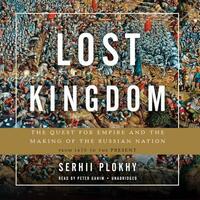Take a photo of a barcode or cover
23 reviews for:
Lost Kingdom: The Quest for Empire and the Making of the Russian Nation
Serhii Plokhy
23 reviews for:
Lost Kingdom: The Quest for Empire and the Making of the Russian Nation
Serhii Plokhy
informative
reflective
slow-paced
An insightful history on the events and forces surrounding the country of Ukraine and its neighbours. Plokhy doesn’t just look at the changes, but also gives a concise backstory to every character of meaning.
challenging
informative
reflective
slow-paced
Nationalism in Russia, from the Middle Ages until now, and how it defined Russia’s relation to its neighbors, including Poland, Ukraine, Lithuania, and Belarus. The author loves long and complex sentences, but overall the book is well worth reading — and very timely.
The book provides a good overview of the main narratives regarding Russian identity and empire by state and elite actors from the 16th century onwards, highlighting key shifts and continuities under different regimes. Not surprisingly giving the author’s Ukrainian background and the resurgence of the “Ukrainian question” since 2014, the book mainly critically examines attempts at envisaging a greater Russian nation encompassing Ukraine and Soviet and post-Soviet attempts to come to terms with an actually existing Ukrainian nation. However, the focus on elite narratives and imperial politics overlooks how ordinary Russians have envisaged their nation or why certain narratives have found fertile ground. Moreover, the role of Russian as an imperial lingua franco and a marker of civilization in Central Asia, especially during the Soviet period, is overlooked in favor of Ukraine. Here, and also when discussing other aspects of the Soviet period, Plokhy perceives matters with a Moscow and at times Kyiv centered gaze. Perhaps inevitably so in an overview book for a broad audience, certain issues are explained only briefly or narrated in a decisive manner, but this also leads to some problems, e.g. when Plokhy asserts that the Soviet Union started the Cold War. Nevertheless, it remains an insightful overview of and introduction to Russian nationalism in a longterm perspective which avoids the trap of Russian exceptionalism so often seen in Western studies.
Absolutely sensational. It felt like reading an ancient storybook that depicts a whole new world. Serhii Plokhy's hard work disseminating and collating Russian historical information throughout the book in an even (though almost perfectly even) manner. I say this because the chapters that narrated the Russian medieval times up to the late 19th century were fable-like in the sense that I was immersed in historical Russia (or Rus') and experienced the events unfolding. Afterwards, it gets a bit too statistical and logical for my taste. Yet, it is still very informative and engaging with such smooth writing.
I now understand why Russia is suffering from finding a "national" identity, and why the wars it rages go on. However, their actions are still not justifiable.
The book gives notable mainstream Russian figures such as Ivan the Great, Stalin, Lenin and Putin character whom you see as humans with their own convictions or beliefs, challenges, fears and goals (though very extreme). This doesn't, however, diminish the crimes they've committed.
10/10 recommendation for anyone wishing to learn Russian history or world history. I will admit though, that reading this book does require a little extra capacity and full engagement.
I now understand why Russia is suffering from finding a "national" identity, and why the wars it rages go on. However, their actions are still not justifiable.
The book gives notable mainstream Russian figures such as Ivan the Great, Stalin, Lenin and Putin character whom you see as humans with their own convictions or beliefs, challenges, fears and goals (though very extreme). This doesn't, however, diminish the crimes they've committed.
10/10 recommendation for anyone wishing to learn Russian history or world history. I will admit though, that reading this book does require a little extra capacity and full engagement.
informative
The Russian national identity and what it contains is a subject that should be explored and Serhii Plokhy does the job well. I have some doubts about the later chapters that deal with the recent war between Ukraine and the Russian Federation, yet skip over the ethnic cleansing that took place at the end of WWII.
challenging
informative
inspiring
fast-paced



